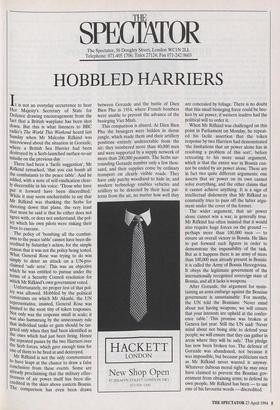SPECTATOR
The Spectator, 56 Doughty Street, London WC1N 2LL Telephone: 071-405 1706; Telex 27124; Fax 071-242 0603
HOBBLED HARRIERS
It is not an everyday occurrence to hear Her Majesty's . Secretary of State for Defence drawing encouragement from the fact that a British warplane has been shot down. But this is what listeners to BBC radio's The World This Weekend heard last Sunday when Mr Malcolm Rifkind was interviewed about the situation in Gorazde, where a British Sea Harrier had been destroyed by a Serb-launched surface-to-air missile on the previous day. There had been a 'facile suggestion', Mr Rifkind remarked, 'that you can bomb all the combatants to the peace table'. And he added, with a note of self-vindication clear- ly discernible in his voice: 'Those who have put it forward have been discredited.' While it may seem uncharitable to say that Mr Rifkind was thanking the Serbs for shooting down that plane, the very least that must be said is that he either does not agree with, or does not understand, the pol- icy which his own pilots were risking their lives to execute.
The policy of 'bombing all the combat- ants to the peace table' cannot have been dis- credited by Saturday's action, for the simple reason that it was not the policy being tested. What General Rose was trying to do was simply to deter an attack on a UN-pro- claimed 'safe area'. This was an objective which he was entitled to pursue under the terms of a Security Council resolution for which Mr Rifkind's own government voted. Unfortunately, no proper test of that pol- icy was allowed. Hobbled by the political constraints on which Mr Akashi, the UN representative, insisted, General Rose was limited to the most tiny of token responses. Not only was the response small in scale; it Was also hamstrung by the unnecessary rule that individual tanks or guns should be tar- geted only when they had been identified as the ones which had just been firing. Hence the repeated passes by the two Harriers over the Serb forces, which gave enough time for one of them to be fired at and destroyed. Mr Rifkind is not the only commentator to have leapt at the chance to draw a false conclusion from these events. Some are already proclaiming that the military effec- tiveness of air power itself has been dis- credited in the skies above eastern Bosnia. The comparison has even been drawn
between Gorazde and the battle of Dien Bien Phu in 1954, where French bombers were unable to prevent the advance of the besieging Viet Minh. This comparison is absurd. At Dien Bien Phu the besiegers were hidden in dense jungle, which made them and their artillery positions entirely undetectable from the air; they numbered more than 40,000 men and were supported by a supply network of more than 200,000 peasants. The Serbs sur- rounding Gorazde number only a few thou- sand, and their supplies come by ordinary transport on clearly visible roads. They have only patchy woodland to hide in, and modern technology enables vehicles and artillery to be detected by their heat pat- terns from the air, no matter how well they are concealed by foliage. There is no doubt that this small besieging force could be bro- ken by air power, if western leaders had the political will to order it.
When Mr Rifkind was challenged on this point in Parliament on Monday, he repeat- ed his facile assertion that the token response by two Harriers had demonstrated `the limitations that air power alone has in resolving a problem of this sort', before retreating to his more usual argument, which is that the entire war in Bosnia can- not be ended by air power alone. These are in fact two quite different arguments: one asserts that air power on its own cannot solve everything, and the other claims that it cannot achieve anything. It is a sign of intellectual dishonesty that Mr Rifkind so constantly tries to pass off the latter argu- ment under the cover of the former.
The wider argument, that air power alone cannot win a war, is generally true. Mr Rifkind has often insisted that it would also require huge forces on the ground perhaps more than 100,000 men — to ensure an overall victory in Bosnia. He likes to put forward such figures in order to demonstrate the impossibility of the task. But as it happens there is an army of more than 100,000 men already present in Bosnia: it is called the Army of Bosnia Hercegovina. It obeys the legitimate government of the internationally recognised sovereign state of Bosnia, and all it lacks is weapons.
After Gorazde, the argument for main- taining an arms embargo against the Bosnian government is unsustainable. For months, the UN told the Bosnians: 'Never mind about not having weapons; we will ensure that your interests are upheld at the confer- ence table.' This promise was broken at Geneva last year. Still the UN said: 'Never mind about not being able to defend your people; we will ensure that they can gather in areas where they will be safe.' This pledge has now been broken too. The defence of Gorazde was abandoned, not because it was impossible, but because politicians such as Mr Rifkind never wanted it anyway. Whatever dubious moral right he may once have claimed to prevent the Bosnian gov- ernment from obtaining arms; to defend its own people, Mr Rifkind has been — to use one of his favourite words — discredited.


























































 Previous page
Previous page